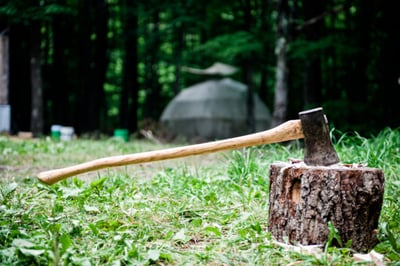Sometimes it is good to see a place you know well through someone else’s eyes. This past week I had that opportunity as I toured a teacher from the George School outside of Philadelphia around our camps. She was interested in introducing an environmental focus into her high school English classes, and had gotten a grant to visit summer camps to learn how they “taught” environmental awareness.

During her time at Farm & Wilderness, she met with Barns and Gardens apprentices at Indian Brook, campers who had just returned from their cabin trips at Saltash Mt. Camp, Flying Clouders and staff and directors from all three sites. Here are a few “nuggets of wisdom” she gleaned from her tour:
“Kids typically stop complaining after one round of chores. The first day they get up early to collect wood. The second day they break the wood up into kindling. The third day they cook using the kindling. It takes them a full cycle to realize that breakfast doesn’t magically happen and if they don’t do their day of chores, they don’t eat.”

“Food tastes better here. You have to work for it.”
“I want the kids to have a sense of wonder about the world. I also want to encourage a sense of giving back to the earth, rather than just the ‘take take take’ practice we often live by.”
“Wilderness contributes to community building and personal growth because it provides a space of immediate consequence. You step in the wrong place and you get hurt. Your pal forgets to bring the stove, you can’t cook dinner.”
“First you teach them to appreciate their surroundings, how beautiful nature is, then you create buy in. You have to have buy-in to teach sustainability.”
“My school has camping trips every year and they are terrible. They are always telling us how to feel about nature. ‘It’s so beautiful, look how peaceful.’ Then we have to take water samples. Here I get to just BE in nature and decide for myself what to value.”
 Our woods, farm, and fields provide not just a great setting, but incredible teaching and learning opportunities. Through our experiential approach, we gain an appreciation of the wonders and importance of the natural world, and how to be better stewards—essential values and skills for our time.
Our woods, farm, and fields provide not just a great setting, but incredible teaching and learning opportunities. Through our experiential approach, we gain an appreciation of the wonders and importance of the natural world, and how to be better stewards—essential values and skills for our time.
— Michelle




